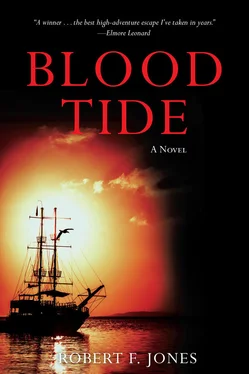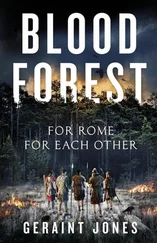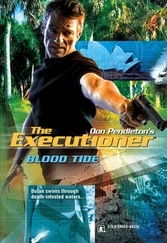Robert Jones - Blood Tide
Здесь есть возможность читать онлайн «Robert Jones - Blood Tide» весь текст электронной книги совершенно бесплатно (целиком полную версию без сокращений). В некоторых случаях можно слушать аудио, скачать через торрент в формате fb2 и присутствует краткое содержание. Год выпуска: 2014, Жанр: Старинная литература, на английском языке. Описание произведения, (предисловие) а так же отзывы посетителей доступны на портале библиотеки ЛибКат.
- Название:Blood Tide
- Автор:
- Жанр:
- Год:2014
- ISBN:нет данных
- Рейтинг книги:5 / 5. Голосов: 1
-
Избранное:Добавить в избранное
- Отзывы:
-
Ваша оценка:
- 100
- 1
- 2
- 3
- 4
- 5
Blood Tide: краткое содержание, описание и аннотация
Предлагаем к чтению аннотацию, описание, краткое содержание или предисловие (зависит от того, что написал сам автор книги «Blood Tide»). Если вы не нашли необходимую информацию о книге — напишите в комментариях, мы постараемся отыскать её.
Blood Tide — читать онлайн бесплатно полную книгу (весь текст) целиком
Ниже представлен текст книги, разбитый по страницам. Система сохранения места последней прочитанной страницы, позволяет с удобством читать онлайн бесплатно книгу «Blood Tide», без необходимости каждый раз заново искать на чём Вы остановились. Поставьте закладку, и сможете в любой момент перейти на страницу, на которой закончили чтение.
Интервал:
Закладка:
The orders came care of a small, potbellied, bright-eyed man named Miller Grilse, ostensibly the American manager of a Baja resort hotel but actually a DEA station boss. Grilse arrived at the dock where they were moored in San José del Cabo while Miranda was in town cashing some traveler’s checks and buying supplies. He gazed deadpan at Curt for a few long moments, then winked broadly, and stabbed his thumb shoreward. They walked up the esplanade toward a cantina.
“Out in the southern Philippines,” Grilse said softly, “there seems to be a major relay station for Golden Triangle heroin. Run by a renegade gringo named Millikan. Maybe not a renegade, though. Maybe a U.S. Navy type. Why, we don’t know. Very little communication these days between agencies. You know how it is.”
They stopped at the cantina and bought a couple of bottles of Tecate, then walked on. Grilse drank left-handed. His right biceps had been slashed by a Japanese samurai sword during World War II, out in the Philippines where he’d organized guerrilla bands for the OSS. He’d been a tough little guy then. He was even tougher now.
“Millikan’s got his own private navy there,” Grilse continued. “Local pirates, what they call mundo . Moslems, most of them. They bring the shit out of Thailand by fast boats, then funnel it east through contacts in the Philippine Navy. We want you to make your way out there, casual-like, as if you were on the run still from the Caribbean. Cover your tracks as well as you can. Steal a boat or something. Then ease on up to the Millikan operation and wangle a ride with them. You’ve got a good reputation as a fast-boat driver. Hell, you know what to do, you’ve done it often enough the past few years.”
“What kind of boat?”
“Sail,” Grilse said. “Something you can handle by yourself. Why not steal that ketch you’re in right now?”
“No,” Curt said. “That gal’s okay. I wouldn’t want to do a number on her.”
“You sweet on her?”
“I guess so.”
“All the better. More convincing that way if Millikan checks you out.”
“I don’t know,” Curt said.
“Well, get yourself a boat one way or another. Your old pal Phil Chalmers is in Manila now, with Military Air Transport. Crooked as ever. We could have taken him out any time we wanted since the two of you did that job in Panama, but we’ve let him dangle out there and kept a close eye on him. He seems to be cozying up to Millikan. If you need help making contact with Millikan’s outfit, Chalmers might be able to help you.”
“What do I do once I’ve joined up with Millikan?”
“Get the details of the operation. Find out if they really are ONI. Or whatever. Then ease on out and get the word back to me. We’ll take it from there.” He finished his beer, belched like a foghorn, then flipped the empty over the seawall into the milky surf. He winked again, glum-faced but happy. He loved his work.
“Wish I was going with you,” Grilse said. “That’s my old stomping grounds out there. Great place, the PI. The men are bastards, wicked as sin, but the women are the best-looking babes in all Asia. Suerte , sailorman. And look out for the Benny boys.” He winked again, cryptically, turned on his heels, and waddled up an alley toward his pickup truck.
When Miranda got back from town, Curt was gone. Brillo was gone. Seamark was gone, too.
At first she couldn’t believe it. Maybe while she was in town, she told herself, some tourists had come by demanding a sailing trip—now or never. People from the States like to demonstrate their power by making spur-of-the-moment decisions like that, changing plans or directions at the snap of a credit card. But she knew she was kidding herself. They were gone. One evening, sitting on a bollard at the end of the dock, she started cursing—every salty phrase she’d learned in half a dozen languages. A potbellied little gringo stopped to watch her. He had a crippled arm, she saw, poor fellow. He winked at her clownishly, gave her a crooked thumbs up, and walked on.
Later that week she signed on as mate of a forty-one-foot Morgan beating its way back north after a race. In Ensenada she asked for her pay and with it bought the catboat. It was a seagoing Hyundai compared with the solid workmanship of her ketch, but it was seaworthy—twenty-four feet long, beamy, with a deep center-board and a new mast. In it she sailed north to the land of her birth. Up there maybe her wounds would heal. Years ago, when her parents were still together, they had all gone to visit her dad’s folks at their house near Port Albion. She’d loved the house—big, warm, and shiplike, with lots of pictures and books on the walls. There were old harpoons, and guns and swords and old steering sweeps leaning every which way, and model ships swinging from the rafters, sea-shells that hooted ghosts in her ears. She remembered a big brass kettle the size of their Volkswagen, it seemed, that her grandfather said he’d used in the olden days to boil down blubber for whale oil. His own father had found it on a cannibal island out in the South Seas. “Why, Miranda,” he’d told her one day, “you could cook a whole missionary in this pot—two if they was little fellers.”
Every day, back then, they had gone sailing up and down that cold, bright, piny-smelling coast. Her dad let her take the helm of the old family schooner, and for the first time she felt the strength of the wind thrumming down through canvas, and watched the water boil closer and closer along the gunwales as they heeled to its might. “Spooming,” her granddad called it in old sailor talk. Right then, she realized, with the wheel kicking under her hands, she was seeing the entire course of her life unreeling ahead of her.
Now she’d strayed off course through no fault of her own. Maybe her father could steer her back. Maybe.
SEVEN

“Viv?”
At first she didn’t recognize him. The man who came down the broken stone steps to the dock looked old enough to be her grandfather—white hair, slouched shoulders, the whiskers on his mottled face grown out in uneven patches, as if he’d tried to shave a week ago, then given it up halfway through, then picked up again on the other side a few days later, then quit for good. But it couldn’t be her granddad. He’d died long ago. This man must be her father.
“No,” she said, forcing a smile. “Miranda. How you doing, Dad?”
His eyes were murky green, the whites gone a curdled yellow, gummed at the corners of the lids as if his head leaked phlegm. Dim, slow eyes. Then they lighted up for a moment. But it was a weak spark, what you might expect from a corroded plug in a junkyard engine.
“Miranda?”
“Yes.”
Now he tried to smile. Cracked lips, yellow teeth. The skin around his eyes creased into a million tiny white ridges that crawled across his cheekbones like albino wireworms. An old cut on his eyebrow popped open and beaded with blood. Even the blood looked pale, but maybe it was the light.
One pocket on his dark-blue wool CPO shirt was ripped and dangling. The other bulged with a dingy handkerchief crusted with dried blood. His khakis were worn through at the knees, stained and rumpled. Even his shoes were falling apart—old navy dress shoes, cracked from want of polish, and so worn at the heels that when he turned to lead the way back up to the house, she could see the brads gleaming through the rubber.
The house was a mess, too. Dust lay thick on the shelves and tables, clothes were scattered and crumpled like disaster victims on the bare, dull floors, plates, bowls, cups, and cutlery left wherever they’d last been used, unwashed, caked with mummified food and the dusty corpses of flies. The house smelled of garbage and stale coffee. Impossible. He’d always been a stickler for neatness. “Shipshape and Bristol-fashion”—if she’d heard him say it once in her childhood, she’d heard it a thousand times. Home from the sea, he would spring surprise “white-glove inspections” on her mother, finding minuscule smears of grease or infinitesimal deposits of dust in the hardest-to-reach places, then issuing demerits in a voice that was only half-kidding. His khakis were always pressed to a razor crease, his shoes spit-shined to a mirror gloss.
Читать дальшеИнтервал:
Закладка:
Похожие книги на «Blood Tide»
Представляем Вашему вниманию похожие книги на «Blood Tide» списком для выбора. Мы отобрали схожую по названию и смыслу литературу в надежде предоставить читателям больше вариантов отыскать новые, интересные, ещё непрочитанные произведения.
Обсуждение, отзывы о книге «Blood Tide» и просто собственные мнения читателей. Оставьте ваши комментарии, напишите, что Вы думаете о произведении, его смысле или главных героях. Укажите что конкретно понравилось, а что нет, и почему Вы так считаете.












